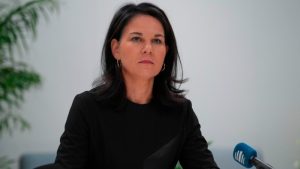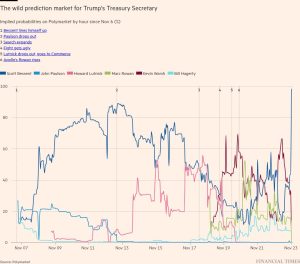Moldova’s wineries shift away from Russian gas
Unlock the Editor’s Digest for free
Roula Khalaf, Editor of the FT, selects her favourite stories in this weekly newsletter.
Wineries in the small eastern European country of Moldova are increasingly turning to renewable energy as part of the nation’s westward shift and efforts to curb its reliance on Russian gas.
Cricova, founded in 1952 by a Soviet decree that bears the signature of Joseph Stalin, is one of the vineyards that reduced its energy costs by 25 per cent after building solar parks and improving its insulation.
“All of the wine production process has been modernised . . . as we are adapting to today’s consumers and global trends”, said Cricova director Sorin Maslo.
After Russia’s full-scale invasion of neighbouring Ukraine, Moldova accelerated its westward shift, applying for EU membership and looking for alternative energy sources to the Russian state-owned giant Gazprom.
Winemakers — a significant sector of the country’s economy — followed suit and started installing solar panels and insulating their facilities to reduce energy consumption. Cricova also pulled from public display Vladimir Putin’s wine collection of 607 bottles which the Moldovan government gave the Russian leader when he visited in 2008.
Moldova’s energy ministry estimates that last year households and businesses tripled their renewable energy sources, particularly photovoltaics.
Smaller businesses such as the new vinery Luca have also benefited from state subsidies to go green.
The owner Ion Luca told the Financial Times he avoided gas from the outset, when construction started in 2018, by investing in insulation and an electricity-powered heat pump at his winery in the town of Cricova, near the eponymous state company.
“We were Gazprom’s hostages and I did not want to depend on them,” Luca said.
Luca, who is part of the fourth generation of winemakers in his family, said that when the Soviets annexed Moldova in 1944, his grandparents lost their house, their vineyards and all other properties. They were labelled “enemies of the people” and sent to Siberia in 1949 as part of one of Stalin’s mass deportations.
After Stalin’s death, his family returned to Moldova, and his father helped set up the wine production at the Soviet winery in Cricova the dictator had ordered, but the Lucas never got their land back. In 2018, Ion Luca purchased his new vineyard which aims to be “the most sustainable winery” in Moldova.

Purcari, a Moldovan brand that has a strong presence on western markets after turning its back on Russia, is also going green.
Vasile Tofan, chair of the board of Purcari, said the shift was prompted by Russia’s repeated wine embargoes in the 2010s when Moscow sought to squeeze Moldova into cheaper deals.
“Fool me once, shame on thee, fool me twice, shame on me,” said Tofan. The Russian bans initially put Purcari “on our knees” but eventually proved “a blessing in disguise” as it accelerated the westward pivot.
In 2014, when Russia annexed Crimea, Purcari produced “a liquid manifesto”, Freedom Blend, a wine made from Crimean, Georgian and Moldovan grape varieties. Purcari has since become a staple at festivals in neighbouring Romania and is available in the UK, Germany, Poland, as well as online.
Since 2021, Purcari has managed to cover a third of its energy consumption using solar panels. Tofan told the FT that the shift was bound to happen because Russia had been throttling Moldova’s gas supply and imposing price rises long before invading Ukraine, with the war just the latest catalyst for this transition.
Cricova, Luca and Purcari are also trying to make their business more sustainable by investing in lighter bottles, given that the biggest share of the industry’s carbon footprint is generated by producing and transporting heavy glass bottles. Luca also exports bag-in-box wines to Scandinavian markets.
A focus on wine quality and the revival of local varieties, which were lost in the Soviet era, can also boost exports, said Diana Lazăr, senior wine director at the international development company Chemonics.
Russia’s squeeze on the Moldovan economy “galvanised the transition to a more sustainable business model which does not just use cheap resources and can become a competitive advantage in the long run”, said Lazăr. “This way, the Moldovan winemakers are aligning themselves to the global trend.”
#Moldovas #wineries #shift #Russian #gas




